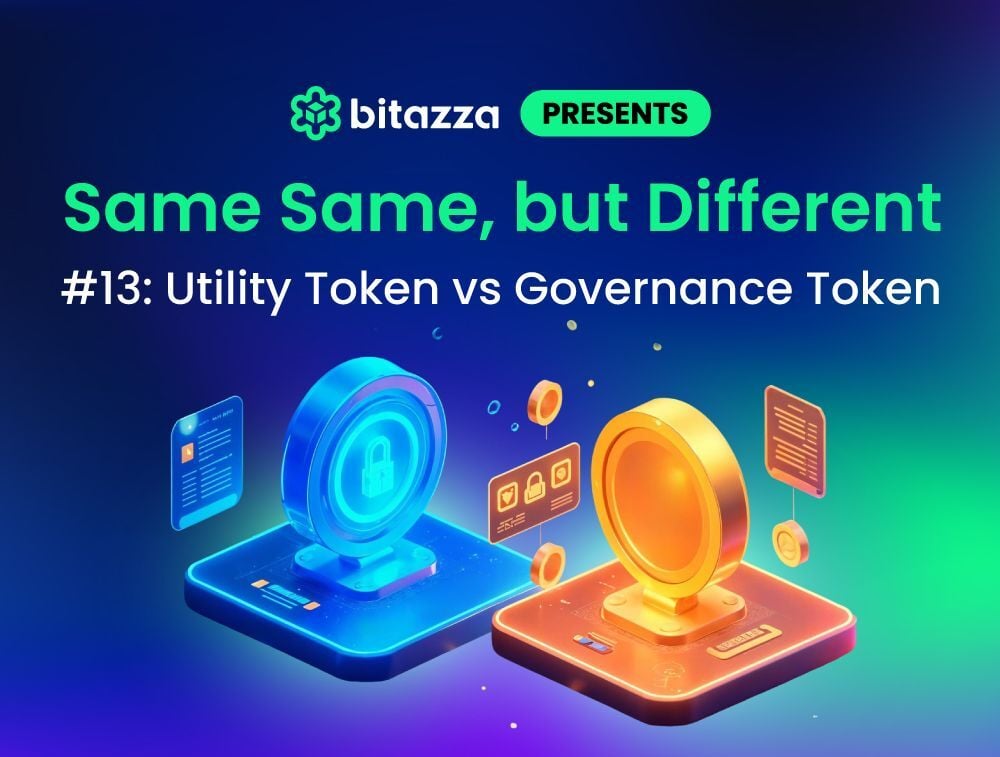Share this
Same Same, but Different #13: Utility Token vs Governance Token

Not all crypto tokens are created equal. Some tokens help you use a platform, while others help you shape how that platform evolves. That’s the key difference between Utility Tokens and Governance Tokens.
They’re both digital assets with real use cases within a network. However, they play very different but critical roles for both the user and the platform itself. Let’s break it down.
Same Same: Both Are Tokens with a Purpose
Both utility tokens and governance tokens are types of crypto tokens that live on blockchains. They give holders specific rights within a project’s ecosystem. These rights include being able to access services or voting to influence decisions.
They both:
- Can be traded, held, or used
- Operate on existing blockchains (like Ethereum, BNB Chain, or Solana)
- Are often distributed through staking, rewards, or participation
But they serve very different roles within that system.
Different: Access vs. Influence
Utility Token: Powering the Product
Utility Tokens give holders access to a platform’s products, services, or benefits. Think of it like an in-app currency or key that unlocks features. For example, if you are holding FDM tokens, you can enjoy tiered-level fee discounts on the Bitazza platform.
How it works:
- Used to pay for services (e.g., trading fees, NFT mints, subscriptions)
- Often required to participate in the ecosystem
- Sometimes burned or locked to manage supply
- Enables product access or discounts
- Incentivizes user participation, such as fee discounts
- Core to platform functionality
Example:
- FDM (on Bitazza Global) is used for trading fee discounts, rewards, and exclusive access
- BNB is used to pay fees on Binance and access launchpad sales
- SAND is used inside The Sandbox metaverse to buy assets and land
Governance Token: Vote on the Future
A Governance Token gives holders the right to vote on key decisions ranging from protocol upgrades to how treasury funds are spent. For example, with FDM tokens, you can also access Freedom World to participate in the Freedom ecosystem and vote on platform decisions.
How it works:
- Token holders submit and vote on proposals
- More tokens = more voting power (usually)
- Used in DAOs and decentralized projects
- Empowers users to help steer the project
- Promotes decentralization
- Often comes with staking or yield options
Example:
- UNI token holders vote on Uniswap protocol changes
- AAVE holders help decide risk parameters and incentives
- COMP is used for governance in Compound’s DeFi protocol
Quick Comparison Table
|
Feature |
Utility Token |
Governance Token |
|
Main Use |
Access platform features |
Vote on protocol decisions |
|
Ownership Benefit |
Discounts, services, usage |
Influence, proposals, voting |
|
Value Driver |
Demand for utility or service |
Demand for governance rights |
|
Participation |
Platform users |
Community members, DAO voters |
|
Examples |
FDM, BNB, SAND, MATIC |
UNI, AAVE, COMP, MKR |
Why It Matters
Utility tokens and governance tokens often coexist in the same ecosystem, with each serving a specific purpose. In fact, many projects, including Bitazza, started with a utility-focused token, and then added governance layers later as the community started to grow. This was how the BTZ token evolved into FDM.
Utility Tokens help you:
- Actively use and engage with the platform
- Gain access to features, including staking rewards
Governance Tokens help you:
- Play a part in deciding the project’s future
- Achieve decentralized, community-led innovation
While Utility and Governance tokens play critical roles in their respective networks, you can buy, sell or transfer these tokens from the Bitazza platform, together with 100+ other cryptocurrencies all serving various functions across the crypto world.
Same functions. Different roles. Same same, but definitely different.
Check out more “same same but different” topics on our blog
Share this
- Crypto 101 (75)
- Trading (68)
- Crypto Weekly (50)
- Educational (43)
- Bitazza 101 (41)
- Featured (19)
- Missions (8)
- Market (6)
- Bitazza Insight (5)
- Research (5)
- Derivatives (4)
- TradingView (4)
- Education (3)
- Futures Trading (3)
- Freedom Shards (1)
- Freedom Token (FDM) (1)
- Intermediate (1)
- Product and features (1)
- Tether (1)
- Tether (USDt) (1)
- crypto exchange (1)
- January 2026 (2)
- December 2025 (13)
- November 2025 (6)
- October 2025 (10)
- September 2025 (8)
- August 2025 (17)
- July 2025 (29)
- June 2025 (13)
- May 2025 (14)
- April 2025 (12)
- March 2025 (8)
- February 2025 (8)
- January 2025 (8)
- December 2024 (7)
- November 2024 (5)
- October 2024 (14)
- September 2024 (9)
- August 2024 (14)
- July 2024 (3)
- June 2024 (48)
No Comments Yet
Let us know what you think